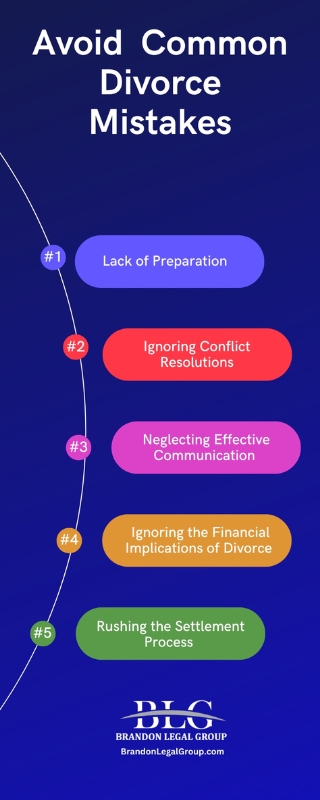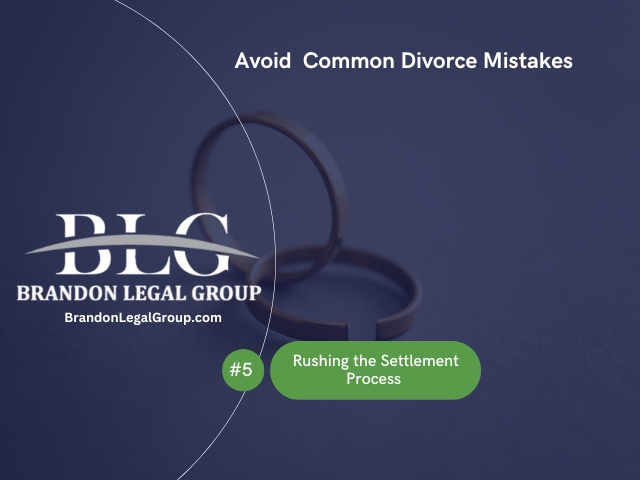 The settlement process in divorce is a critical phase that lays the foundation for the future. Unfortunately, many individuals make the mistake of rushing this process in their eagerness to finalize the divorce quickly. By neglecting to engage in thoughtful consideration and seeking professional guidance, they may unknowingly agree to terms that have long-term implications and face unexpected challenges later on. This article will explore the importance of careful consideration and seeking professional guidance. We will also provide fictional examples to illustrate the consequences of rushing the settlement process.
The settlement process in divorce is a critical phase that lays the foundation for the future. Unfortunately, many individuals make the mistake of rushing this process in their eagerness to finalize the divorce quickly. By neglecting to engage in thoughtful consideration and seeking professional guidance, they may unknowingly agree to terms that have long-term implications and face unexpected challenges later on. This article will explore the importance of careful consideration and seeking professional guidance. We will also provide fictional examples to illustrate the consequences of rushing the settlement process.
Engaging in Thoughtful Consideration
One of the most common mistakes individuals make during a divorce is rushing through the settlement process without engaging in thoughtful consideration. However, carefully evaluating all aspects of the settlement is essential to ensure it aligns with one’s long-term goals and interests.
Emphasizing the Importance
Thoughtful consideration allows individuals to understand the implications of the settlement terms fully. It carefully reviews financial aspects, property division, child custody arrangements, and other relevant provisions. Considering thoughtfully, individuals can make informed decisions that best serve their needs and protect their future well-being.
Fictional Example: John and Lisa, eager to finalize their divorce and move on, rushed through the settlement process. They quickly agreed to a settlement without fully comprehending its long-term implications. Unfortunately, their hasty decision led to unexpected challenges down the line. Months after the divorce, John realized that the division of assets favored Lisa more than he initially thought. He also discovered ambiguous clauses in the settlement that led to disagreements and disputes. This fictional example illustrates the consequences of rushing the settlement process without engaging in thoughtful consideration.
Seeking Professional Guidance
To avoid rushing the settlement process, seeking professional guidance from a divorce attorney is crucial. An attorney’s expertise gives individuals a comprehensive understanding of the settlement terms and helps protect their interests.
Encouraging Individuals to Consult with Attorneys
Divorce attorneys have extensive knowledge and experience in navigating the complexities of settlements. They can review the proposed settlement, identify potential pitfalls, and advise individuals on the best action. In addition, consulting with an attorney ensures that individuals are fully aware of the legal ramifications and implications of the settlement terms.
Fictional Example: Unlike John, Lisa recognized the importance of seeking professional guidance during settlement. She actively involved her attorney, who carefully reviewed the settlement agreement. Lisa’s attorney identified potential pitfalls and ambiguities, allowing her to address these issues before finalizing the settlement. This additional layer of scrutiny helped protect her interests and ensure a more favorable outcome.
Evaluating the Emotional Impact
Aside from the legal and financial aspects, rushing the settlement process can also have significant emotional consequences. Therefore, it is essential to evaluate the emotional impact of the proposed settlement and ensure that it provides a sense of closure and emotional well-being.
Consideration of Emotional Factors
Divorce is a deeply emotional journey; the settlement process is vital in finding closure and moving forward. However, when individuals rush through the settlement, they may miss the chance to fully process their emotions and address any lingering unresolved issues. Instead, taking the time to evaluate the emotional impact of the settlement can lead to a more complete and satisfactory resolution.
Fictional Example: John’s desire to finalize the divorce quickly led him to rush through the settlement process without considering the emotional aspects. As a result, he struggled with unresolved emotions and a lack of closure in the months following the divorce. His hasty decision prevented him from fully addressing his emotional needs, resulting in prolonged emotional distress.
By considering the emotional impact of the settlement and allowing sufficient time for emotional healing and closure, individuals can set themselves up for a healthier emotional future post-divorce.
Exploring Alternative Dispute Resolution
Another way to avoid rushing the settlement process is by exploring alternative dispute resolution methods, such as mediation or collaborative divorce. These methods encourage open communication, negotiation, and cooperation, providing a more holistic approach to resolving issues. These methods prioritize open communication, negotiation, and cooperation, enabling a more holistic approach to resolving issues. Unlike traditional litigation, alternative dispute resolution fosters a collaborative environment where parties actively participate in finding mutually acceptable solutions.
Mediation, for instance, involves a neutral third party facilitating discussions between the disputing parties, promoting dialogue and understanding. Collaborative divorce, on the other hand, consists of a team of professionals, including lawyers, therapists, and financial advisors, working together to guide the couple through the divorce process with minimal conflict.
Benefits of Alternative Dispute Resolution
Alternative dispute resolution methods offer numerous benefits, including reduced conflict, preserved relationships, and more control over the decision-making process. In addition, individuals can reach a settlement that better meets their unique needs and priorities by engaging in meaningful dialogue and exploring creative solutions. By embracing alternative dispute resolution methods, individuals can cultivate respect, understanding, and fairness, leading to more satisfactory outcomes for all parties involved.
Fictional Example: Recognizing the potential benefits, Lisa opted for mediation instead of rushing through the settlement process. With the guidance of a skilled mediator, she and her ex-spouse engaged in constructive dialogue openly discussed their concerns, and worked together to find mutually acceptable solutions. This collaborative approach helped them reach a settlement that addressed their interests and fostered a more amicable post-divorce relationship.
Conclusion
Rushing the settlement process is a common mistake made during divorce proceedings. However, taking the time to consider thoughtfully and seek professional guidance can prevent unforeseen challenges and regrets. Individuals can avoid this pitfall and secure a more satisfactory outcome by considering thoughtfully, seeking professional guidance, evaluating the emotional impact, and exploring alternative dispute resolution methods.
Taking the time to carefully evaluate the settlement terms, consulting with a divorce attorney, considering the emotional impact, and exploring alternative methods can lead to a more comprehensive and informed decision-making process. Seeking professional guidance from a divorce attorney provides valuable insights and ensures that individuals have a comprehensive understanding of the legal implications of the settlement. Remember, divorce is not just about the legal aspects but also emotional closure and well-being.
